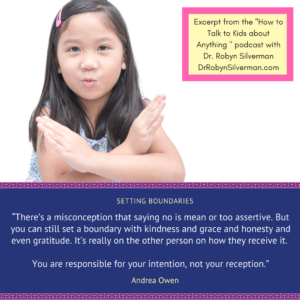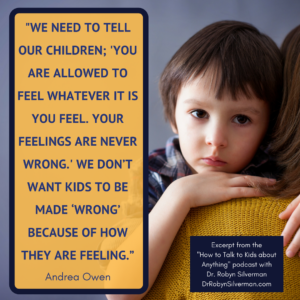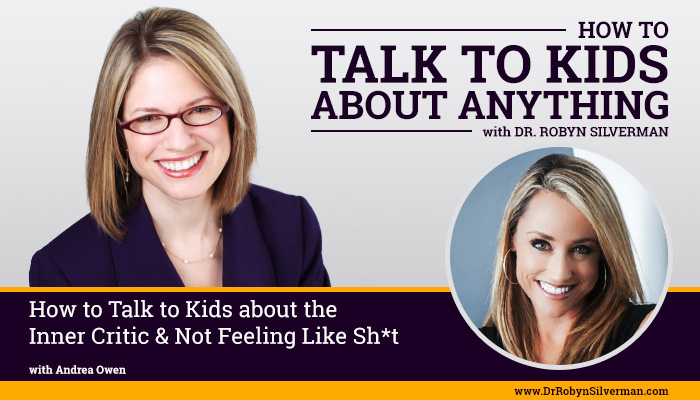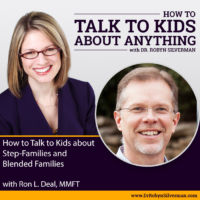Podcast: Play in new window | Download
Subscribe: Apple Podcasts | RSS | More
How to Deal with the Inner Critic & To Stop Feeling Like Sh*t
This podcast episode focuses on how to help parents regulate their own emotions, connect better with their children and coach their children through tough situations using “emotion coaching.” While daily life can be stressful as a parent, we can achieve more peaceful parenting and happier, more connected kids!
Special Guest: Andrea Owen
Author and Activitist, Glennon Doyle Melton, says that “Life is hard- not because you are doing it wrong- but because life is hard.”  How we cope with the life we have been given can be the ticket to isolation, frustration and self destruction OR the key to our happiness. We all get ourselves into a cycle of habits that either serve us or destroy us and during this podcast we are going to shine high beams on the negative habits that are bringing us and our children down and the tools that can help us embrace happiness again.
How we cope with the life we have been given can be the ticket to isolation, frustration and self destruction OR the key to our happiness. We all get ourselves into a cycle of habits that either serve us or destroy us and during this podcast we are going to shine high beams on the negative habits that are bringing us and our children down and the tools that can help us embrace happiness again.
Life coach. Author and Self described Hellraiser. Andrea Owen is passionate about empowering women to value themselves and fiercely love who they are. She helps high-achieving women let go of perfectionism, control, and isolation—urging them to choose courage and confidence instead. Her new book is called How to Stop Feeling Like Sh*t: 14 Habits that Are Holding You Back from Happiness. You can learn more about Andrea and her new book in the show notes to this podcast or on www.yourkickasslife.com.
The podcast provides:
- Tips: How to cope with your inner critic
- Scripts: How to talk to kids about the inner critic, how to discuss people pleasing, how to say no gracefully.
- How these issues affect parents and what the fallout is when we fall into these bad habits that make us miserable.
- What to do when the inner critic rears its head and how to recognize it when it does.
- How we can support our kids when their inner critic takes hold.
Important Messages:

- The inner critic is universal but it doesn’t show itself in the same way for everyone. We want to make sure we don’t base our decisions on this negative voice.
- When our child comes to us with that negative inner voice in his or her ear, remember empathy. Say; “I know how that feels.” Show them that you “get it.”
- We need to teach kids to separate the facts from the fiction of our negative, critical voice.
- Say; “You are allowed to feel whatever it is you feel. Your feelings are never wrong.” We don’t want kids to feel that they are wrong because of how they are feeling.”
- We also need to make sure kids know that while they can feel whatever they are feeling—they are responsible for their behavior.
- And if you do engage in negative behaviors, you are responsible for cleaning up your mess.
- Break down your life into different areas so you can cope with your inner critic.
- Comparison is a specialty of the inner critic.
- What are your biggest triggers? What do you say to yourself in different circumstances- are you positive, neutral or negative towards yourself?
- BS meters go off when we try to lie to ourselves and change a negative into a positive.
- Develop a mantra. You acknowledge the inner critic without a charge or positive or negative.
- We can be very tough on ourselves when it comes to parenting.
- Are you numbing your feelings? Co-dependency, eating disorders, drinking, spending, busyness, etc? It’s very hard to feel your feelings. We wind up numbing-out. Be careful of emotional illiteracy.
- Have a discussion about the “dog and pony show” and pleasing others without pleasing ourselves.
- We get so used to saying yes to others that we don’t even realize that we don’t want to do it!
- We can be afraid of people not liking us or afraid of what others might think of us when we say no to doing something (even if we are already too busy).
- Sometimes we just want someone to hear us out but we don’t want advice. We want someone, with an emotional relationships with us, to listen.
Notable Quotables:
- “The first thing that comes to mind when I think of the key to happiness is that it’s grounded in gratitude and being thankful for what you have.”
- “The inner critic is universal but it doesn’t always sounds like an articulation of thoughts or a dialogue. For some, it’s just an overall feeling that they are not enough.”
- “We don’t want to base our feelings and our decisions on that inner critical voice. We want the win to be that they hear it very quickly and they can do something about it in a short amount of time.”
- We need to tell our children; “You are allowed to feel whatever it is you feel. Your feelings are never wrong.” We don’t want kids to be made ‘wrong’ because of how they are feeling.”
- Let’s tell our kids; “You are allowed to feel whatever you feel. You can be mad at me, but you are responsible for your own behavior. No slamming doors, no being nasty to me, no being disrespectful—and if you do any of those behaviors, we need you to clean up your mess just like you’d need to clean up your mess if you spilled a bag of goldfish crackers all over the floor.”
- “You can’t change what you didn’t know isn’t working.”
- “At the end of the day, your inner critic is trying to keep us safe. They do not want us to rock the boat. They do not want us to change anything. That’s why our inner critics get really chatty when we are thinking about going for a promotion at work or asking for a raise or asking someone out on a date.”
- I’m not a fan of having a fierce throw-down with our inner critic. To me, that’s bullying the bully.”
- “For a long time, I was the mayor of “Numb-Your-Feelings-Town.”
- “Girls are often brought up to put others needs before our own, to be the nurturers, to take care of everything at a high cost. The cost may be ourselves or the cost may be our values and what we really want to do.”
- We need to ask ourselves; ‘What are you afraid might happen if you say no?”
- “I just pulled my sleeves up and put my hair in a ponytail because I love this work so much!”
- “These are our triggers. For women, we don’t want to be perceived as demanding, hard to work with or aggressive, so when we say no or when we give feedback that’s less than stellar, that can illicit shame in us—and that’s what we are running away from.”
- “People-pleasing works until it doesn’t.”
- “There’s a misconception that setting a boundary, or saying no is mean or too assertive. But you can still set a boundary and you can still give feedback that isn’t positive with kindness and grace and honesty and even gratitude. It’s really on the other person on how they receive it. You are responsible for your intention not your reception. These are some hard lessons to learn.”
- “I think teens are met with a lot of advice that they didn’t even ask for. But teenagers are smart- enough that if they want advice they will ask for it! They are not two or three years old. They have the capacity to ask for it when they need it.”
- You can ask; “How can I support you right now?” or… “How can I be awesome for you right now?”
- “Listen to your inner critic and ask yourself what stories you are making up based on what you are seeing online, what you are seeing, what you are feeling. What stories are you making up about yourself?”





